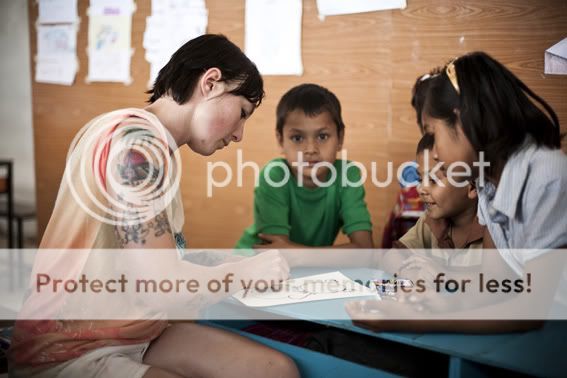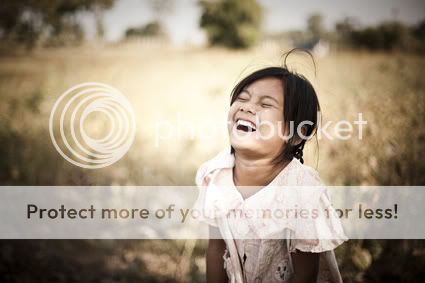
“For over 40 years almost unnoticed by the international community, one of the most brutal military dictatorships in the world has ruled the country of Burma. Hundreds of thousands of refugees have been forced to flee the violence and instability of their homeland to places like Thailand. Thousands of vulnerable children, some orphaned and some unaccompanied, live in refugee camps and migrant communities, facing extreme poverty and hunger. It is these children that Children on the Edge support.”

In November 2010, New Zealand artists Tanja Jade and Peap Tarr along with Pat Shepherd and Alex Chalmers did something radical with their lives. They left behind the comfort of their homes in the first world and boarded planes and buses that would deliver them to the Thai/Burmese border. The freshly vaccinated artists, armed with paints and pens, were on a mission: to bring imagination and artistic creativity to the forgotten refugee children of Burma.


Children on the Edge was founded in 1990 initially to aid children in Romanian orphanages. Since then the project has extended to include offshoot program Good Karma Project in Burma, and most recently the Little Lotus Project, a continuation of the work done by Good Karma.
After touching down in Bangkok, Tanja Jade had the dubious pleasure of boarding a bus for an 8-hour journey to the Burmese boarder. “As we got closer to Maesot, the bus would stop for more and more police checks.” Peap took the night bus and with each stop in the mountains he saw Burmese stowaways jump out of the luggage compartment and run off into the jungle.

The team of artists knew in advance what they were walking into – a large community of refugees living on and around a rubbish dump. They eke out an existence by sifting through fresh rubbish for things they can sell. Everyone works, children included, and the situation is dire enough that education is a luxury and comes second or third to working the rubbish dump.

“We worked at the school for two or three days before visiting the dump,” says Tanja. “Even though you could kind of see it in the distance behind the school, I had no idea just how bad it was. The new school building was really quite lovely and the headmaster had been working on a veggie garden that seemed to be thriving. There was a well and the children were happy and having fun, so I was thinking this isn’t really so bad.”

Although Pat, camp leader, prepared the artists for what was in store, no amount of talk could brace them for the actuality.
“We walked through a bush track to some small bamboo houses,” recalls Tanja, “Dogs, chickens and flies were everywhere. We went past a very polluted lake. The smell was quite unbearable and the flies were insane. Then we were smack bang in the middle of the dump. The landscape was just mountains of rubbish. A rubbish truck arrived while we were there and dumped a load. People and dogs run over instantly. Immediately people began searching for anything they could sell, and the dogs fought for scraps of food.

“It is totally devastating, especially to see the kids who were in my class earlier that day sitting they’re sorting through piles of dirty rubbish, their hands covered with black dirt. My heart broke when I saw a young mother breast feeding her three month old baby, then laid him down to sleep on a bit of newspaper while she went back to work.”



Rudolf Virchov, the German anthropologist and key founder of social medicine said that physicians are the natural attorneys of the poor, and social problems fall to a large extent within their jurisdiction. Many of us living in the developed world feel powerless, or else simply disinterested in the welfare of those far away, living in poverty and despair. The artists from the Little Lotus Project empowered themselves by utilizing what skills they can share, to assist in the development of others. It is not just humanitarian doctors who have a responsibility to their fellow human; it is all of us.


The artists taught toy-making workshops, adorned the Skyblue School with paintings and endeavored to teach imagination to children to whom this is a foreign concept. “Communication was an issue,” says Tanja. “There are several different dialects in Burma. Also, getting the kids to use their imaginations and feel free to do their own thing was a challenge. They were all amazingly fast learners and incredible at replicating designs, but when it came to making up their own artwork or toy, it was a bit of a push.” This may be in part due to the circumstances and political climate, which the community is forced to adhere to. The idea of individual power is not a reality for refugees living in poverty.


For those of us who have our freedom, who are able to make simple choices – we owe it to ourselves and to all of those who’s voices are ignored to use the spoils of democracy to aid our brothers and sisters.
How you can help: http://littlelotusproject.bandcamp.com/
Purchase this awesome compilation and feel good doing it because your $$ will go directly to Children On The Edge, woooooooooooooohoooooooooo!!!!!!
Everyone is addicted to facebook, so add this page! http://www.facebook.com/LittleLotusProject



Background on Burma
Since 1962 the military regime has waged a violent and inhuman war on over 100 ethnic groups throughout Burma. Many of these ethnic groups are forced to hide in inaccessible jungles from military attacks. Others, not able to escape the attacks suffer indescribable horror, villages are burnt to the ground, villagers killed, used as food and weapon carriers and human land mine sweepers, women are raped and men tortured. Peace to these people is something from the past, and to some, it’s something they have never known.
This brutal violence and instability has created a mass migration of refugees to neighboring countries, especially Thailand. Thousands have been accepted as refugees, however as Thailand is not a signatory to the UN Convention on refugees many people fleeing Burma, who should under international law be given refugee status are denied this and hence many, in sheer desperation, enter Thailand as illegal migrants. There are now believed to be more than 1.5 million illegal migrants from Burma living in Thailand, under threat of deportation, back to an uncertain fate.
These illegal migrants often arrive with nothing, and with no legal status the children have difficulty accessing an education and often fall victim to the sex and drug trafficking trade, whether it be for survival or through kidnapping.
In their homeland they face poverty, persecution and hunger, as migrants & refugees they still face the same, yet in Thailand we have the ability to access and assist them.
http://www.childrenontheedge.org.nz
All photos by Pat Shepherd

Wow this is so sad, but so beautiful. What an amazing thing to do!
ReplyDelete